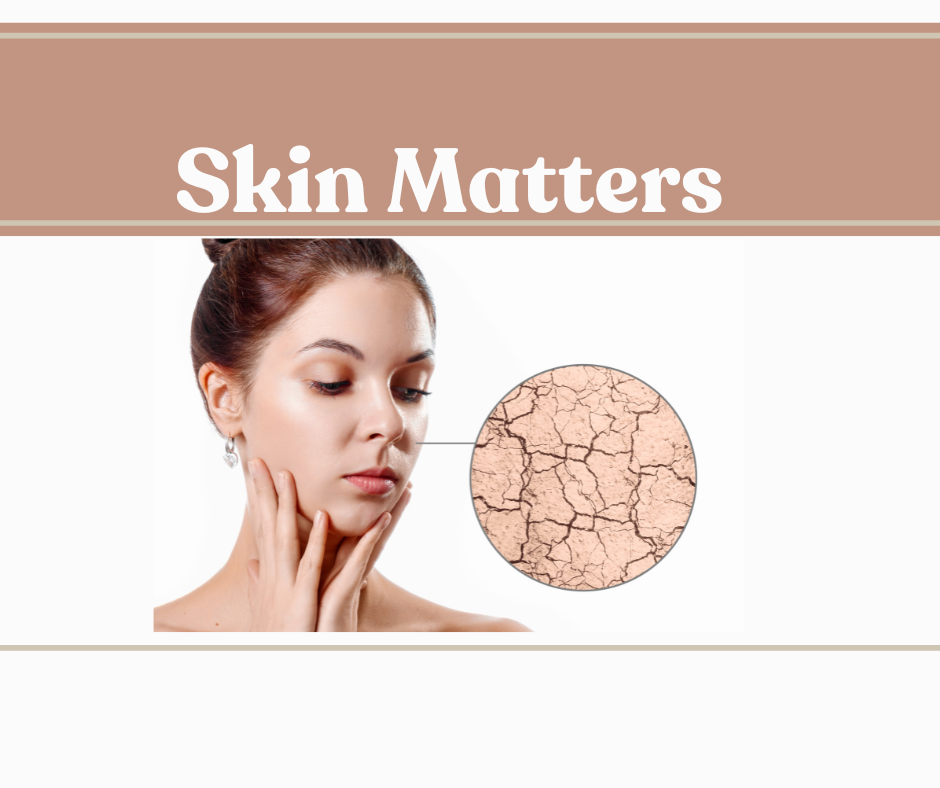
A Holistic Overview of Healthy Skin
Overview of Skin Structure
- Epidermis: The outermost layer, acts as a barrier.
- Dermis: Middle layer housing connective tissue, blood vessels, and hair follicles.
- Hypodermis: Deepest layer, primarily for fat storage.
Functions of the Skin
- Protection: Shields against pathogens and physical abrasions.
- Regulation: Manages body temperature through sweat and blood flow.
- Sensation: Contains nerve endings that respond to touch, pressure, temperature, and pain.
Common Skin Concerns
Dry Skin
Causes:
- Weather: Cold, windy climates; low humidity.
- Sun Exposure: Prolonged UV exposure.
- Hot Showers: Long, hot baths/showers.
- Harsh Soaps: Strong cleansers and detergents
- Dehydration: Not drinking enough water.
- Skin Conditions: Eczema, psoriasis.
- Aging: Reduced oil production.
- Medications: Certain drugs dry the skin.
- Nutrition: Lack of essential vitamins and fatty acids.
- Genetics: Hereditary predisposition.
- Skincare Practices: Over-exfoliation, lack of moisturizing, chemically derived or alcohol-based products.

Acne
Causes:
- Hormonal Changes: Fluctuations during puberty, menstruation, pregnancy, or due to certain medications.
- Excess Oil Production: Overactive sebaceous glands producing too much oil (sebum).
- Clogged Pores: Dead skin cells, oil, and dirt blocking hair follicles.
- Bacteria: Growth of *Propionibacterium acnes* (P. acnes) bacteria in clogged pores.
- Inflammation: Inflammatory response to clogged pores and bacteria.
- Diet: High glycemic foods, dairy products, and certain dietary choices may exacerbate acne.
- Stress: Increased stress levels can trigger or worsen acne.
- Genetics: Family history of acne can predispose individuals.
- Skincare Products: Comedogenic (pore-clogging) products can contribute to acne.
- Friction or Pressure: Frequent contact with skin from items like phones, helmets, or tight clothing.
Premature Aging

Causes:
- Sun Exposure: UV radiation causes skin damage and accelerates aging.
- Smoking: Contributes to wrinkles and reduced skin elasticity.
- Poor Diet: Lack of essential nutrients and high sugar intake can damage collagen and elastin.
- Alcohol: Excessive consumption dehydrates the skin and causes inflammation.
- Lack of Sleep: Insufficient rest impairs skin repair and regeneration.
- Stress: Chronic stress increases cortisol levels, which can accelerate aging.
- Dehydration: Inadequate water intake results in dry, less elastic skin.
- Genetics: Family history can predispose individuals to early aging.
- Pollution: Environmental pollutants cause oxidative stress and skin damage.
- Insufficient Skincare: Neglecting skin protection and hydration can lead to premature aging.
Lifestyle Changes for Better Skin:
1. Hydrate Adequately: Aim for at least 8 glasses of water a day to keep your skin hydrated and help flush out toxins.
2. Eat a Balanced Diet: Incorporate fruits, vegetables, lean proteins, and healthy fats into your diet. Foods rich in antioxidants like berries, nuts, and green tea can protect skin from damage. Include sources like fish, flaxseeds, and walnuts to maintain skin hydration and reduce inflammation.
3. Get Regular Sleep: Aim for 7-9 hours of sleep per night. Sleep helps repair and regenerate skin cells.
4. Exercise Regularly: Engage in regular exercise to improve circulation, which helps deliver oxygen and nutrients to your skin. Sweating can help unclog pores and remove toxins.
5. Manage Stress: Practice yoga, meditation, or deep breathing exercises to manage stress, which can trigger skin issues like acne and eczema.
6. Protect Your Skin from Sun Damage: Always use a broad-spectrum sunscreen with at least SPF 30, wear protective clothing, and seek shade when the sun is strongest.
7. Avoid Smoking: Smoking narrows blood vessels and decreases blood flow, leading to less oxygen and nutrients reaching your skin. It also damages collagen and elastin.
8. Limit Alcohol Intake: Excessive alcohol can dehydrate your skin and lead to issues like redness and inflammation.
9. Maintain a Good Skincare Routine: Use a mild cleanser to remove dirt and makeup without stripping your skin’s natural oils. Hydrate your skin with a moisturiser suitable for your skin type. Exfoliate regularly to remove dead skin cells but not too often to avoid irritation.
10. Avoid Harsh Chemicals: Opt for natural and chemical-free skincare products to prevent irritation and skin damage.
Conclusion
In conclusion, understanding your skin type and needs is crucial for an effective skincare routine. Healthy skin is a combination of good products, a balanced diet, and a healthy lifestyle. Each small change contributes to an overall healthier and more vibrant complexion. Stay consistent with your skincare to see the best results.
